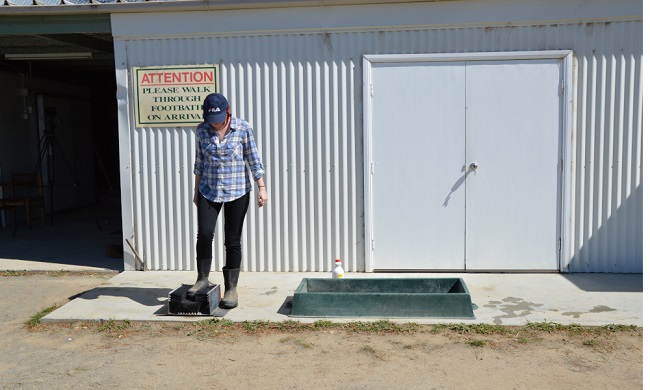
Biosecurity means doing everything you can to reduce the chances of an infectious disease being carried onto your farm by people, animals, equipment, or vehicles, either accidentally or on purpose. Follow these steps to help reduce the threat of infectious disease contaminating your herd
Showing Your Horse
Use your own trailer and don’t ship your horses with horses from other farms. Ship only in a trailer that has been cleaned & disinfected. If you “smell horse” in the empty trailer, it has not been cleaned & disinfected properly. Don’t let your horse touch other horses, especially nose to nose. Don’t share equipment (e.g., water, feed buckets, brushes, or sponges). Wash your hands, especially after helping other people with their horses. Don’t let strangers pet your horse, especially those with horses at home or people who have been out of the country in the past 2 weeks. Before leaving the show grounds, clean and disinfect tack, boots, equipment, and grooming supplies. Brush off dirt or manure; then disinfect with spray or wipes. When you get home, shower, blow your nose, and put on clean clothes and shoes before going near other horses.
Visiting Other Farms, Shows or Auctions
Have a pair of shoes or boots that you save for visiting and don’t wear around your own horse. Wear plastic shoe covers: plastic bags from newspapers work well. If you are going to be working with horses on another farm, wear coveralls or plan to change clothes before returning to your horse. If there are farms you visit all the time and you can’t change clothes and shoes, be sure their vaccination program and biosecurity practices are as good as your own.
Visitors to Your Farm
It is best to have only one way into your farm. Mark this as the main entrance. Park away from the horses. Doing that will help keep disease-carrying organisms from being tracked from car floors or tires to your horses. If the farrier or veterinarian needs to park closer, be sure their tires and shoes have been disinfected. Ask all visitors to wear clean clothes and shoes. Give visitors plastic shoe covers, or brush the dirt off their shoes and spray them with disinfectant. If you have many visitors, such as at a farm tour or open house, make a footbath for them to walk through.
Bringing Horses Back from a Show
If one horse has been shown, all your horses need to be vaccinated. Horses that show can bring home germs. Discuss what vaccinations the horses need, and how often, with your veterinarian. If possible, keep horses which were off the farm isolated for at least 2 weeks. Make sure there is no nose-to-nose contact.
Bringing in New Horses
This is the most likely way for infectious diseases to come in so keep every new horse isolated for 30 days. Any pitchforks, grooming tools, or feed and water buckets used with the new horse should not be used with any other horses on the farm. Mark these with red tape, or use red brushes, etc., only for the isolation area. Work with the isolated horse last each day. Alternatively, wear boots and coveralls when working with the isolated horse and remove them before working or going near other horses. You can keep these in a plastic-covered tub near the horse. Always wash your hands and blow your nose after working with the new horse. You could carry germs to your other horses in your nose.
Using Disinfectants
How To Disinfect
Surfaces must be clean for disinfectants to work. Brush off loose dirt and manure. If possible, wash the item with detergent first (laundry or dish soap works well) and then use a disinfectant. Most grooming tools can be dipped in disinfectant. Tack can be wiped with a disinfectant wipe or a disinfectant-dampened cloth. Shoes can be brushed or scrubbed off and then sprayed with disinfectant.
Examples of Disinfectants
Household Bleach; Mix ¾ cup of bleach per gallon of water. If you don’t have a measuring cup handy, you can mix 1 part bleach to 10 parts water. This formula works for shoes, grooming equipment, buckets, shovels, and pitchforks. When you use bleach, make sure all dirt and manure have been cleaned off first.
Spray Disinfectant: Be sure the label says it kills bacteria and viruses. Sprays can work well on shoes, grooming equipment, and tack. Try to remove all manure and dirt before spraying.
Waterless Hand Sanitizers: They come in gels or hand wipes. These are good for use at a show or after visiting other horses. Be sure to work the cleaner all through your fingers and under the nails.
Other Disinfectants: There are many on the market. Always mix and use according to the label. These work well even if there is a little manure or dirt left on the surface. These are good choices for disinfecting trailers and car tires, and they also work well in footbaths.
Making an Easy Footbath
You will need: A low plastic pan or bin, wide enough to fit an adult’s foot, shallow enough to step into easily. A plastic doormat (the “fake grass” mats work well). A disinfectant that works when manure or dirt is present and water.
Mix the disinfectant with water following label instructions. Put the doormat in the plastic pan. Add disinfectant so that the bottom of the “grass” is wet. Ask visitors to walk through the footbath, wiping their feet on the mat. The “grass” scrubs their shoes a bit as they wipe them and applies the disinfectant. When the liquid starts to get dirty, empty it and put in new disinfectant.
Provided by the United States Department of Agriculture Animal and Plant Health Inspection Service.
Related Articles & Free Email Newsletter Sign Up
How to Identify and Treat Lock Jaw in Horses
How to Train a Horse to Not Shy Away from Objects
What Are a Zorse and a Zonkey?




Comment here